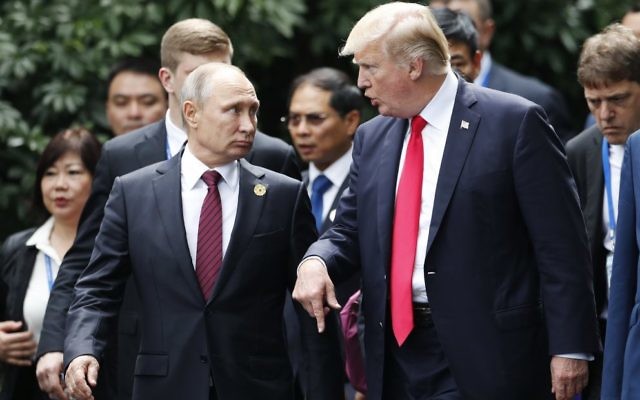Syria deal: Israel’s prayers answered?
AMERICA and Russia have reached an agreement to remove Iranian forces, Hezbollah and other jihadists from Israel's doorstep.
AMERICA and Russia have reached an agreement to remove Iranian forces, Hezbollah and other jihadists from Israel’s doorstep.
On Saturday Donald Trump and Vladimir Putin met in Vietnam to laud a new arrangement that focuses heavily on Israel’s key fear about the Syrian civil war: that the conflict is entrenching Iranian forces close to the Golan Heights.
The two presidents released a join statement saying that it will lead to the “reduction, and ultimate elimination, of foreign forces and foreign fighters”.
Their new arrangement takes an existing ceasefire agreement from July, broadens it, and adds in specific plans for removing Iranians and other foreign fighters from the areas around Syria’s borders with Israel and Jordan.
The arrangement is seen as a breakthrough for the US, given that Russia is an ally of the Syrian regime and the Syrian regime is heavily dependent on Iran. But against the odds, and despite the fact that Russia is so committed to the Syrian regime that it has been defending it against UN conclusions that it used chemical weapons, the administration in Washington is confident that it will get Russia to root out Iranian influence.
A senior State Department official said in a press briefing that “the Russians have taken upon themselves an obligation within a defined area, according to the negotiations that we undertook, to ensure the departure of those Iranian and Iranian proxy elements in that area”.
The official said that the arrangement will apply to other groups too, including the Syrian affiliate of al-Qaeda, and commented: “These elements – these extremist groups and these foreign-backed militias – have used the Syrian conflict over the last five years to increase their presence in this part of Syria, which has undermined the ceasefire and poses a threat to Jordan and Israel.”
The new development sounds like the answer to the prayers of Israel, which has long worried about fomenting radicalism and a build-up of Tehran’s power on its border. But in Jerusalem, many are taking the view that the devil is in the detail.
It is not officially known how far away from the border with Israel the jihadists and Iranian forces will be banished, but there are suggestions that in places the required distance will be as little as five kilometres – a small distance for operatives with modern weapons.
Israel’s Regional Cooperation Minister Tzachi Hanegbi was disparaging about the arrangement on Sunday, saying that it “does not answer Israel’s unequivocal demands that there will be no developments that bring Iranian or Hezbollah forces closer to Israel’s border with Syria in the north”.
Middle East analyst Efraim Inbar told The AJN, “The distance from the border is far less than Israel wanted.” He believes that “the Russians and the Iranians are playing games and the Americans are swallowing it”.
Iran is still determined to have a long “corridor” of land where it has leverage, running from Iran to the Israeli border and is not poised to give up this ambition, said Inbar, president of the Jerusalem Institute for Strategic Studies think tank.
While the deal may curb Iranian influence by the border, this influence is still buoyant elsewhere in Syria – and there is no timetable for removing it from the country.
Russian Foreign Minister Sergey Lavrov said this week that there is no commitment to clear Iran-linked militias from Syria. Last Friday, the BBC reported that Iran is building a permanent military base in Syria, citing “a Western intelligence source” and showing aerial images of construction. It said that the Iranian compound is at a site used by the Syrian army outside El-Kiswah, 14 kilometres south of Damascus.
Israel’s Prime Minister Benjamin Netanyahu defiantly told a meeting of his Likud party that whatever ceasefire arrangements are taking hold in Syria, Jerusalem will act as it sees fit – seemingly a way of saying that he will continue to authorise cross-border attacks when they fit his agenda.
“We are controlling our borders, we are protecting our country and we will continue to do so,” Netanyahu said, adding: “I have also informed our friends, firstly in Washington and also our friends in Moscow, that Israel will act in Syria, including in southern Syria, according to our understanding and according to our security needs.”
He was speaking on Sunday, a day after Israel opened fire on the border. A Syrian drone, which was gathering intelligence over Syrian territory, then flew into a demilitarised zone and towards Israel. The IDF shot it down, and Israel’s Defence Minister Avigdor Lieberman released a statement saying that Israel “views with great severity any violation of sovereignty and will respond with force to any provocation”.
NATHAN JEFFAY


comments